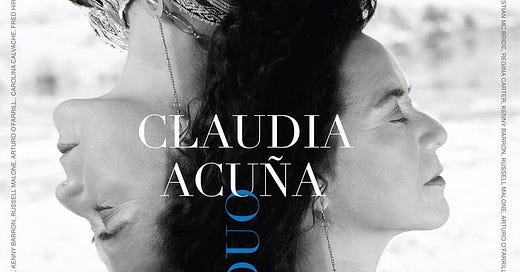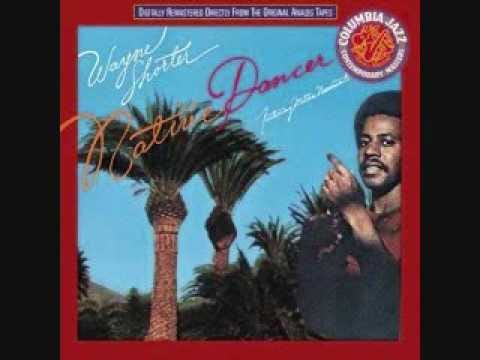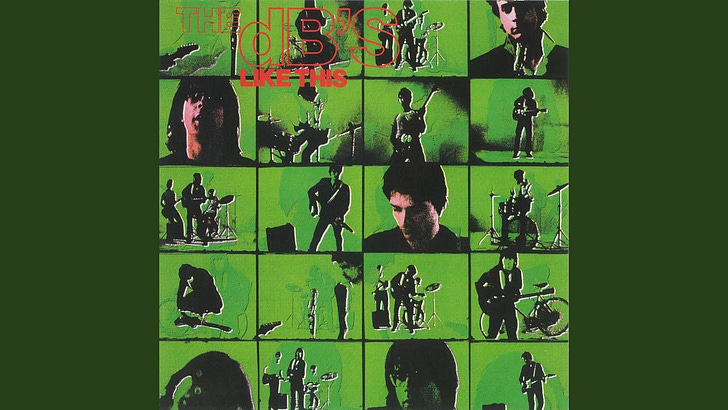I was delighted to discover that one of my favorite singers, Chilean-born Claudia Acuna, has a new record entitled Duo. I have followed her since her first Verve recordings and onward to a more independent and authentic expression of her artistic self realized over the course of her career. Duo is a series of intimate recordings of songs that Acuna holds dear, music of her homeland as well as of Mexico, Argentina, and Cuba.
I first heard Claudia Acuna when I received a review copy of her 2001 release Rhythm of Life from Verve. I was entranced by the singer with a beautiful, clear voice and an original way with a standard or a pop song that put me in mind, at times, of a young Cassandra Wilson, though their approaches were different. I was especially taken with her rendition of "Nature Boy," that funhouse mirror of a song.
It's the same approach that Verve had taken on Acuna's debut album, Wind From the South, the previous year. Already in the time since her arrival in New York City in 1995, the singer had developed a group of musicians with whom she shared a devotion to openness and creativity that included bassist Avishai Cohen and pianists Jason Lindner, Danilo Perez, and Arturo O'Farrill. These musical relationships nurtured her desire to move back towards the folk music that had been her original inspiration, along with popular music, growing up in Chile.
Acuna made use of her network from her early days in New York in casting her collaborators for Duo. Kenny Barron she met at Sweet Basil; the two soon realized they had a shared enjoyment of food, which formed the basis of many conversations. When the time came, Acuna asked Barron to play on the opening number of Duo, "Medianoche" by Chilean songwriters Patricio Manns and Horacio Salinas. This beautiful bolero, with its poetic lyrics that paint the transition between days as a kind of death, marking the passage of our own lives, is a perfect vehicle for Barron's deeply shadowed piano and Acuna's burnished voice.
"Eclipse de Luna" features bassist Christian McBride, a personal friend who was happy to play on Duos. The song was written by Cuban songwriter Margarita Lecuona and later recorded by Joao Gilberto.
She collaborates with Fred Hersch, one of four pianists who appear on Duos, on the song "Jurame (Promise Me)," composed by Maria Graver, one of the first Mexican songwriters to reach international acclaim. "Jurame" was her first international hit, followed by many others--she wrote more than 1000 songs, including the famous "Cuando vuelva a tu lado", popularized by Dinah Washington as "What a Difference a Day Makes." Though Acuna had never met Hersch, she thought his style would be good for the song, and she discovered that he was familiar with her work. It's a standout track on the album, in part because Hersh's approach to the keyboard is more lush than some of the other pianists on Duo.
For the ballad "Piensa en Mi" Acuna turned to a familiar collaborator, Arturo O'Farrill ,who worked with her on the pop-oriented album In These Shoes in 2008. That album is an outlier in her catalog as she mixes Mexican and Cuban songs with jazz standards, Ruben Blades' "Dime," Van Morrison's "Moondance," and the title track, which comes from Kirsty Maccoll's final album, an exploration of Latin and tropical rythms. I think that the album confused some of those listeners who had picked up on her shift to a more introspective style on 2004's Luna (one of my favorite vocal albums) and 2007's En Estre Momento. By comparison, O'Farrill's arrangements come across as a roccoco ride that is not always smooth, yet is generally very rewarding.
To the student of songwriting and poetry, each Claudia Acuna album provides a history lesson with a chance to learn not only about the song itself but also the context from which it emerged. Many Americans are relatively uninformed about the history of the various South American states. Victor Jara's "Manifesto," the last song he wrote before being murdered by Pinochet's September 11 coup in Chile in 1973, is given a dramatic and arousing reading by Acuna and violinist Regina Carter. The lyrics, in part, read:
Yes, my guitar is a worker
shining and smelling of spring
my guitar is not for killers
greedy for money and power
but for the people who labour
so that the future may flower.
For a song takes on a meaning
when its own heart beat is strong
sung by a man who will die singing
truthfully singing his song.
Acuna concludes Duo with two tracks that are really solo performances. On Chick Corea's mystic "Crystal Silence" she uses a prayerful reading of Neville Potter's lyrics as a whispered tribute to the recently deceased Corea himself. On the brief final track, "Yo," she multitracks herself, utilizing overdubbed harmonies and wordless vocal backgrounds.
“With this album, I want to give a little glimpse of what’s coming, in my compositions, my melodies,” Acuna told Downbeat magazine. As a longtime fan, I can't wait to hear what she does next.
You can support this publication by being a free or paying subscriber and letting others know about it. Thanks for taking the time to read NDIM.
Good reading here at NDIM and in the Substackverse beyond:
Wayne Shorter: Mysterious Traveler
One of the least rewarding things that we can do as music listeners, fans, writers, historians, and musicians is to judge an artist's changing musical output against his or her earlier creation when the prevailing style of that music has changed in the interim. Wayne Shorter is routinely lionized as one of the greatest jazz musicians and composers, whic…
The dBs, Marti Jones, Don Dixon, Mitch Easter
The dB’s were one of those bands that should have been at the top of the pile for their time period. Not for hit records, they were never going to achieve that in the early eighties, but as one of the great pop bands to come down the pike (like Buzzcocks). They had the yin and yang that groups with two great songwriters often do, with Peter Holsapple w…








Thanks for getting this record on my radar! I’m probably too old to use “vibes” in a record’s description, but there is very smooth, smoky energy to this LP. Almost like a Latin equivalent of Sade?
Also: I’m glad you linked your previous piece on the dBs. I will take any chance I get to talk up “Like This.”
Glad you're digging it, Kevin. I use 'vibe' all the time-.